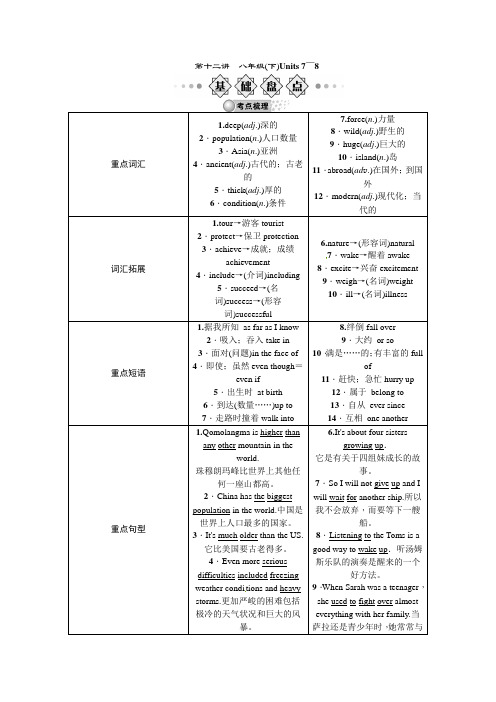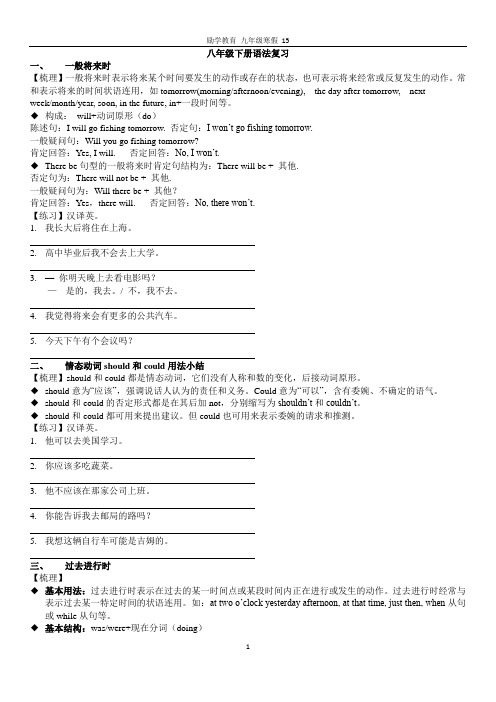【解析版】【中考全景透视】2015中考英语人教版一轮复习导学案+第九讲+八年级(下)Units+1~2
- 格式:doc
- 大小:305.50 KB
- 文档页数:7

九年级英语第一轮复习八年级(下)Unit 9 导学案一.判断下列句子是否符合你听到的短文内容,符合的用“T“表示,不符合的用“F”表示1.Animals like snakes(蛇)usually get more attention because they look dangerous.()2.Lucy wants people to know that less cute animals are important, too.()3.Lucy is especially interested in snakes because she wants to save them.()4.Lucy tells stories on TV about less cut animals.()5.Many people like watching Lucy's fun videos online.()二、短语回顾1.去过(某地) ______________2.乘地铁(两个)______________________________3.鼓励某人去做某事__________4.数千的,成千上万的________________________5.能够做某事__________________6.睡醒/把某人叫醒___________________________7.在白天______________________8.做某事的最佳时间__________________________9.全年_________________________10.离```近___________________________________三、汉译英1.今天咱们去某个不同的地方。
Let's go ____________ ______________ today.2.不管你喜欢英语还是数学,你都必须尽自己最大努力。

人教版中考英语一轮复习第九讲八年级(下)Units 1-2教学设计一. 教材分析人教版八年级下册英语Unit 1和Unit 2主要围绕日常生活和学校生活展开,通过讲述Mike和其家人、朋友的生活经历,让学生掌握一般过去时态、一般现在时态、一般将来时态的运用,以及描述日常生活和学校生活中的事件。
这两个单元的话题贴近学生的生活,有利于激发学生的学习兴趣,提高学生的语言运用能力。
二. 学情分析八年级下册的学生已经掌握了英语学习的基本语法知识和词汇,具备一定的听、说、读、写能力。
但部分学生在语言运用方面仍有困难,对时态的掌握不够扎实。
因此,在教学过程中,需要关注学生的个体差异,针对不同学生的学习需求进行有针对性的教学。
三. 教学目标1.知识目标:(1)掌握一般过去时态、一般现在时态、一般将来时态的运用;(2)熟练运用本单元核心词汇描述日常生活和学校生活中的事件。
2.能力目标:(1)提高学生的听、说、读、写能力;(2)培养学生的语言运用能力和团队合作精神。
3.情感目标:(1)激发学生对英语学习的兴趣;(2)培养学生积极乐观的人生态度。
四. 教学重难点(1)一般过去时态、一般现在时态、一般将来时态的运用;(2)本单元核心词汇的掌握。
(1)一般过去时态、一般现在时态、一般将来时态在不同情境下的运用;(2)复杂句型的构建和表达。
五. 教学方法1.情境教学法:通过设定生活情境,让学生在实际语境中学习、运用英语。
2.任务型教学法:引导学生参与各种实践活动,提高学生的语言运用能力。
3.合作学习法:鼓励学生分组讨论、合作完成任务,培养学生的团队合作精神。
4.激励评价法:注重鼓励学生,激发学生的自信心和学习兴趣。
六. 教学准备1.教材:人教版八年级下册英语教材;2.课件:根据教学内容制作相应的课件;3.练习题:针对本节课内容设计练习题;4.教学道具:与课程相关的生活用品、图片等。
七. 教学过程1.导入(5分钟)利用图片、实物等引导学生谈论日常生活和学校生活中的事件,激发学生的学习兴趣。

第十二讲八年级(下)Units7~87tions and heavy一、根据句意、首字母或汉语提示,填入恰当的单词。
1.My mother likes winter because of the beauty of snow.2.About one third of the earth's surface is land ,the rest is water. 3.You should wait in line to buy tickets.4.We can walk across the river.It isn't deep .5.Wendy is a panda.She eats 8 kilos of bamboo every day. 6.Bianque was a famous doctor in ancient China. 7.I have been back home from the desert(沙漠). 8.I don't like the working conditions(环境) here.9.What technologies(科技) or tools may I use to do this? 10.My brother has never been abroad(到国外) before.二、用括号内所给单词的适当形式填空。
11.Have you decided yet which book to_write(write) for English class? 12.I can feel his excitement(exciting) of becoming a parent. 13.His illness(ill) was worse than the doctor first thought. 14.Day by day she seems to grow a littletaller(tall).15.A thin coat gives little protection(protect) against the cold.三、根据汉语完成英语句子。

第二十讲九年级Units 13~14重点词汇1.litter (v.) 乱扔2.bottom (n.) 底部3.coal (n.) 煤4.ugly (adj.) 丑陋的5.plastic (adj.) 塑料的6.method (n.) 方法7.cruel (adj.) 残酷的8.industry (n.) 工业9.afford (v.) 买得起10.recycle (v.) 回收利用11.president (n.) 总统12.metal (n.) 金属13.standard (n.) 标准14.instruction (n.) 命令15.senior (adj.) 高的16.level (n.) 水平17.thirsty (adj.) 口渴的18.wing (n.) 翅膀词汇拓展1.fisherman→(复数)fishermen2.wood→(形容词)wooden3.harm→(形容词)harmful4.manage→(名词)manager5.gentleman→(复数)gentlemen6.care→体贴人的caring重点短语1.起作用make a difference2.参加play a part in3.关掉turn off4.付费pay for5.扔掉throw away6.拆下pull,down7.倒转upside down8.恢复bring back9.弄得一团糟make a mess10.沉住气keep one's cool11.信任believe in12.首先first of all13.渴望be thirsty for14.在,,前面ahead of15.对,,有责任beresponsible for16.分离separate from重点句型1.Even the bottom of the riverwas full of rubbish.甚至河底也充满垃圾。
2.Everyone in this townshould play a part incleaning itup!小城的每一个人都应该参与清洁工作!3.So together,our action canmake a difference and lead to abetter future!因此,我们齐心协力就能改善环境,创造美好未来!4.The top of the house is an oldboat turned upside down.房子的顶部是一条颠倒过来的旧木船。

第二讲七年级(上)Units 6~9重点词汇1.tomato(n.)西红柿2.bread(n.)面包3.vegetable(n.)蔬菜4.dinner(n.)(中午或晚上吃的)正餐5.chicken(n.)鸡肉6.habit(n.)习惯7.question(n.)问题8.want(v.)想要;需要9.sweater(n.)毛衣10.small(adj.)小的;小号的11.sell(v.)出售;销售;卖12.twentieth(num.)第二十13.August(n.)八月14.fifth(num.)第五15.festival(n.)节日16.music(n.)音乐17.subject(n.)科目18.geography(n.)地理19.Wednesday(n.)星期三20.finish(v.)完成词汇拓展1.fat→(比较级)fatter→(最高级)fattest2.health→(形容词)healthy→(副词)healthily3.sell→(名词)sale4.art→(名词,艺术家)artist5.happy→(反义词)unhappy→(名词)happiness6.music→(形容词)musical→音乐家musician7.use→(形容词)useful8.five→第五fifth→十五fifteen→五十fifty重点短语1.思考;考虑think about2.饮食习惯eating habits3.,,多少钱how much4.一双黑色的鞋子 a pair ofblack shoes5.以很低的价格at very goodprices6.举办一次英语聚会have anEnglish party7.玩得愉快have a good time8.玩游戏play games重点句型1.—Do youlike salad?你喜欢沙拉吗?—Yes,I do/No,I don't.是的,我喜欢。

八年级下册语法复习一、一般将来时【梳理】一般将来时表示将来某个时间要发生的动作或存在的状态,也可表示将来经常或反复发生的动作。
常和表示将来的时间状语连用,如tomorrow(morning/afternoon/evening), the day after tomorrow, nextweek/month/year, soon, in the future, in+一段时间等。
◆构成:will+动词原形(do)陈述句:I will go fishing tomorrow. 否定句:I won’t go fishing tomorrow.一般疑问句:Will you go fishing tomorrow?肯定回答:Yes, I will. 否定回答:No, I won’t.◆There be句型的一般将来时肯定句结构为:There will be + 其他.否定句为:There will not be + 其他.一般疑问句为:Will there be + 其他?肯定回答:Yes,there will. 否定回答:No, there won’t.【练习】汉译英。
1.我长大后将住在上海。
2.高中毕业后我不会去上大学。
3.—你明天晚上去看电影吗?—是的,我去。
/ 不,我不去。
4.我觉得将来会有更多的公共汽车。
5.今天下午有个会议吗?二、情态动词should和could用法小结【梳理】should和could都是情态动词,它们没有人称和数的变化,后接动词原形。
◆should意为“应该”,强调说话人认为的责任和义务。
Could意为“可以”,含有委婉、不确定的语气。
◆should和could的否定形式都是在其后加not,分别缩写为shouldn’t和couldn’t。
◆should和could都可用来提出建议。
但could也可用来表示委婉的请求和推测。
【练习】汉译英。
1.他可以去美国学习。
2.你应该多吃蔬菜。
第十二讲八年级(下)Units7~87tions and heavy一、根据句意、首字母或汉语提示,填入恰当的单词。
1.My mother likes winter because of the beauty of snow.2.About one third of the earth's surface is land ,the rest is water. 3.You should wait in line to buy tickets.4.We can walk across the river.It isn't deep .5.Wendy is a panda.She eats 8 kilos of bamboo every day. 6.Bianque was a famous doctor in ancient China. 7.I have been back home from the desert(沙漠). 8.I don't like the working conditions(环境) here.9.What technologies(科技) or tools may I use to do this? 10.My brother has never been abroad(到国外) before.二、用括号内所给单词的适当形式填空。
11.Have you decided yet which book to_write(write) for English class? 12.I can feel his excitement(exciting) of becoming a parent. 13.His illness(ill) was worse than the doctor first thought. 14.Day by day she seems to grow a littletaller(tall).15.A thin coat gives little protection(protect) against the cold.三、根据汉语完成英语句子。
第十七讲九年级Units7~8重点词汇1.license(n.)证件2.smoke(n.)烟(v.)吸烟;冒烟3.tiny(adj.)极小的;微小的4.fi eld(n.)田野;场地5.regret(v.&n.)遗憾;懊悔6.chance(n.)机会7.manage(v.)完成8.society(n.)社会9.support(v.&n.)支持10.enter(v.)进来11.truck(n.)卡车12.rabbit(n.)兔13.pink(adj.)粉红色的14.express(v.)表示;表达15.receive(v.)接受16.purpose(n.)目的17.position(n.)位置18.victory(n.)胜利词汇拓展1.safe→(反义词)dangerous→(副词)safely→(名词)safety2.educate→教育家educator→教育(n.)education3.choose→(名词)choice4.noise→(形容词)noisy→(副词)noisily5.wolf→(复数)wolves6.medicine→(形容词)medical7.sleep→(名词)sleep→(形容词)sleepy,sleeping,asleep8.energy→(形容词)energetic重点短语1.回嘴talk back2.远离keep,away from3.不但,,而且notonly,but also4.自己做决定make one's owndecision5.挡,,的路get in the wayof,6.回忆think back to7.长大grow up8.对,,严肃be serious about9.捡起来pick up10.同时,一起at the sametime重点句型1.Teenagersshould be allowedtochoose their own clothes.青少年们应该被允许选择他们自己的服装。
第九讲八年级(下)Units1~2trou ble(satisfact ionWhat's the matt er withhouldtake一、根据句意及汉语提示,填入恰当的单词。
1.I get such a strong feeling of satisfaction(满足). 2.Her aunt is a nurse(护士) in this hospital. 3.Thank you again for changing(改变) my life. 4.Can you help me repair(修理) my broken bike? 5.I really had a badheadache(头痛)yesterday.6.There was only onepassenger(乘客)on the bus at that time. 7.They always lose because they have nocourage(勇气). 8.Here are several(一些)books about China. 9.The bike has two differentwheels(轮子). 10.The girl is blind(失明的).The dog helps her. 二、用所给单词的适当形式填空。
11.Her father'sdeath(die) made her very sad.12.This little girl wasexcited(exciting)to see her mother. 13.That boy agreedto_help(help) me carry the heavy box. 14.There are someknives(knife) in the box. 15.He is looking for theowner(own)of the dog.三、根据汉语完成句子,每空一词。
16.昨天劳拉没有去上学,因为她患了重感冒。
Yesterday Laura didn't go to school ,because shehad a bad cold . 17.这条围巾过时了,我想把它送给我妹妹。
The scarf isout of style ,I want to give it to my sister. 18.如果你下次来上海,记得给我打电话。
If you come to Shanghai next time ,remember to call me up . 19.你儿子经常参加各种各样的课后活动吗?Does your son often take part inall kinds of after school activities? 20.我妈妈和她最好的朋友正在打电话。
My mother and her best friend are talking on the phone .一、—What's the matter ?怎么啦? —I have a cold.我感冒了。
【考点精讲】(1)What's the matter?意为“怎么啦?”,该句通常用来询问出了什么状况,遇到什么困难、烦恼等。
类似的表达还有:What's the trouble?或What's wrong?如果表示“某人(物)怎么了?”,我们要在这几种形式后加上with sb./sth.。
eg:—What's the trouble/matter with you?=What's wrong with you?你怎么了?—I have a stomachache.我胃疼。
(2)“have+a+症状名词”表示具有某种“病症、症状”,有“患……(病)”的意思,其中的不定冠词a不可省略。
eg:I have a headache and a cough.我头疼而且咳嗽。
—________?—I have a headache and I don't feel like eating anything.(2014,孝感)A.How are you B.What can I do for youC.What's the matter with youD.How do you like it【解析】C。
由答句“我头疼,不想吃东西”可知问句应询问人的身体状况,故选C。
【即时演练】Ⅰ.单项选择。
1.—Mum,I'm not feeling well.—Oh,dear!__A__(2014,南充)A.What's wrong? B.Not at all.C.All right.2.—Tell me__A__.—Well,it's like…(2013,武汉)A.what is wrong with itB.what is itC.what the matter is with itD.what is it like3.—Tony,what's__B__matter with you?—I have ______toothache.(2013,莱芜)A.a;the B.the;a C./;the D.the;/4.—What's the matter?(2014,贵港)—I have a__C__.I have to go to the doctor.A.head B.tooth C.cold D.noseⅡ.按要求完成句子,每空词数不限。
5.你的电脑出了什么问题?(matter)(汉译英)(2013,福州)What's_the_matter_with_your_computer?6.Peter has_a_high_fever.(对画线部分提问)What's_wrong/What's_the_matter with Peter?7.What's wrong with you,boy?(改为同义句)What's_the_matter with you,boy?二、Aron did not give up after the accident and keeps on climbing mountains today.阿伦在这次事故之后没有放弃,如今他继续爬山。
【考点精讲】give up为“动词+副词”结构的短语,意为“放弃”。
eg:He is a man who doesn't give up easily.他是个不轻易放弃的人。
She wanted to give up maths because it was too difficult.她想放弃数学,因为它太难了。
The people in Ya'an have met lots of difficulties,but they haven't________hope.(2013,安徽)A.picked up B.given upC.looked for D.waited for【解析】B。
pick up“捡起”;give up“放弃”;look for“寻找”;wait for“等待”。
由but可知,前后为转折关系,再结合英语提示可知句意应为“雅安的人们遇到了许多困难,但是他们未放弃希望”。
故选B。
【即时演练】Ⅰ.单项选择。
1.Smoking is not allowed in public places since May 1st.It may be a good chance for some people to__B__smoking.(2014,浙江舟山)A.put up B.give upC.pick up D.look up2.We shouldn't __D__our hopes.Everything will be bette r.(2014,梧州)A.put up B.cheer upC.fix up D.give up3.We must__B__using plastic bags in order to protect our earth.(2014,广西贺州)A.give out B.give upC.give away D.give in4.Smoking is bad for your health.You'd better__B__.(2014,广东)A.set it up B.give it upC.pick it up D.look it upⅡ.根据汉语完成句子,每空一词。
5.如果你想保持身体健康,就不要放弃锻炼。
(2011,天津)Don'tgive up exercise if you want to stay fit.6.因为公共场所禁止吸烟,我相信越来越多的人将会戒烟。
(2014,盐城)I guess more and more people willgive up smoking because it's not allowed in public.三、For example,we can make plans to visit sick children in the hospital or raise money for homeless people.例如,我们可以制订计划到医院里去看望生病的孩子或者为无家可归的人筹钱。
【考点精讲】raise用作动词,用法非常广泛,主要有:(1)意为“筹款;筹募”。
eg:Their sons and daughters raised money for their house.他们的儿女为他们的住房筹集资金。
How much did you raise for school?你筹集了多少钱办学校?(2)意为“养大;培养;饲养”。
eg:The farmer raises cows and sheep.那个农民饲养了一些母牛和羊。
(3)意为“举起;抬起;升起”。
eg:Raise your hand if you want to ask questions.如果你要问问题,请举手。
【辨析】raise/rise两个词都有“举起;提高;升起”之意,但其用法不尽相同。
◆rise是不及物动词,是“升起;上升;上涨”的意思。
表示由低变高的变化过程。
eg:The sun rises in the east and sets in the west.太阳从东方升起而落在西方。